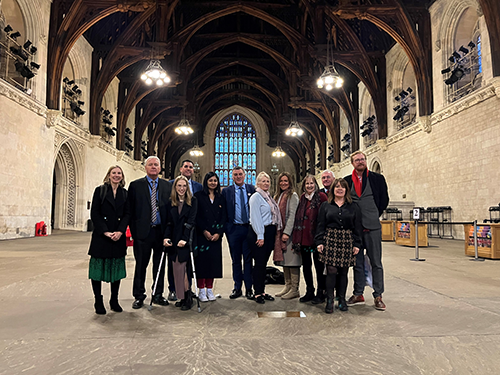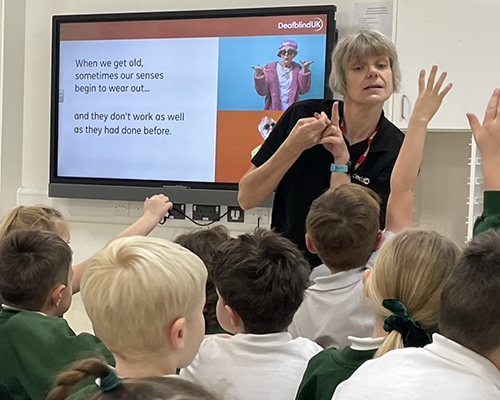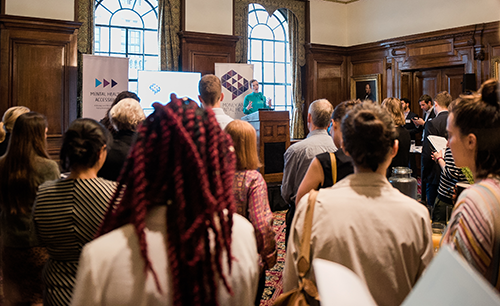Disability 2024 winners: Contact
Why they won
- Outcomes: The campaign convinced the government to change it guidance to ensure families could benefit from the vouchers
- Collaboration and service-user involvement: The charity piggybacked on, and amplified, an existing campaign started by the mother of a child who was entitled to vouchers
- Sustainability: The entitlement to free meal vouchers will endure, benefiting up to 164,000 families
Contact realised that 164,000 children were missing out on their free school meals entitlement, for any one of several reasons: they may have been too ill to attend school, were waiting for a suitable school place, or could not eat the meals because of a health condition.
 This meant that the children, many with conditions such as diabetes, epilepsy or autism, were missing out on the equivalent of £570 a year in financial support – even though the law stated that those who couldn’t claim their meal should be issued with a supermarket voucher instead. In some cases, this was causing families to get into debt and turn to foodbanks, Contact found.
This meant that the children, many with conditions such as diabetes, epilepsy or autism, were missing out on the equivalent of £570 a year in financial support – even though the law stated that those who couldn’t claim their meal should be issued with a supermarket voucher instead. In some cases, this was causing families to get into debt and turn to foodbanks, Contact found.
The charity discovered that Natalie Hay, the mother of an affected disabled child, had begun campaigning for access to the vouchers after her son received some for the first time during lockdown. Contact began working with Natalie to galvanise interest among other parents and take the campaign to the government.
Natalie’s crowdfunding campaign paid for lawyers to draft letters to the government alleging discrimination, and template resources for parents to request a reasonable adjustment in place of their child’s free school meal. Other tactics included media activity, and lobbying of MPs and peers.
Eventually the government conceded that its current practice of excluding some children from their free school meals entitlement was indeed discriminatory, and agreed to update its guidance, with new guidance expected to be published in March 2024.
The guidance has now been updated and Contact has heard from hundreds of families who have begun receiving supermarket vouchers as a result of the campaign.
It estimated that if every family that was eligible to claim their vouchers did so, the gain to those families would be around £93m.
Charity Awards chair of judges Chris Sherwood, CEO of RSPCA, said Contact was a highly credible organisation with a portfolio of good, impressive work that was exemplified by this campaign.
Katie Ghose, CEO of KIDS, added that “the cost that society puts on people for being disabled is just huge”, and that this achievement would make a tangible difference to so many families.
CC Reg no. 284912
Highly Commended
Deafblind UK
Deafblindness is a dual sensory loss condition that affects around 450,000 people in the UK, awareness of it among young people and school settings is low. This means that people with the condition may not get the support they need, and may feel isolated. Deafblind UK set out to rectify this gap by creating “Lesson in a Box: Discovering Deafblindness” for teachers and their pupils – a comprehensive portfolio of resources that explains the condition through fun interactive lesson plans and assemblies. The charity has so far distributed Lesson in a Box to 1,671 schools across England, reaching 729,000 pupils, and believes that 3.3 million people have greater understand of deafblindness as a result.
Money and Mental Health Policy Institute
Many people who suffer from mental health problems find that it can affect their ability to process information and communicate, and this means that essential services like banks and utilities can be hard to access, or cause stress and anxiety. The Institute’s Mental Health Accessible programme encourages these providers to make their services more inclusive by awarding them a quality kitemark when they reach certain levels of accessibility and support. By offering three tiers of accreditation – basic, advanced and leading the way – firms are incentivised to continually improve. The charity’s research community – 5,000 people with lived experience of mental ill health – provides feedback on the firms’ services.


